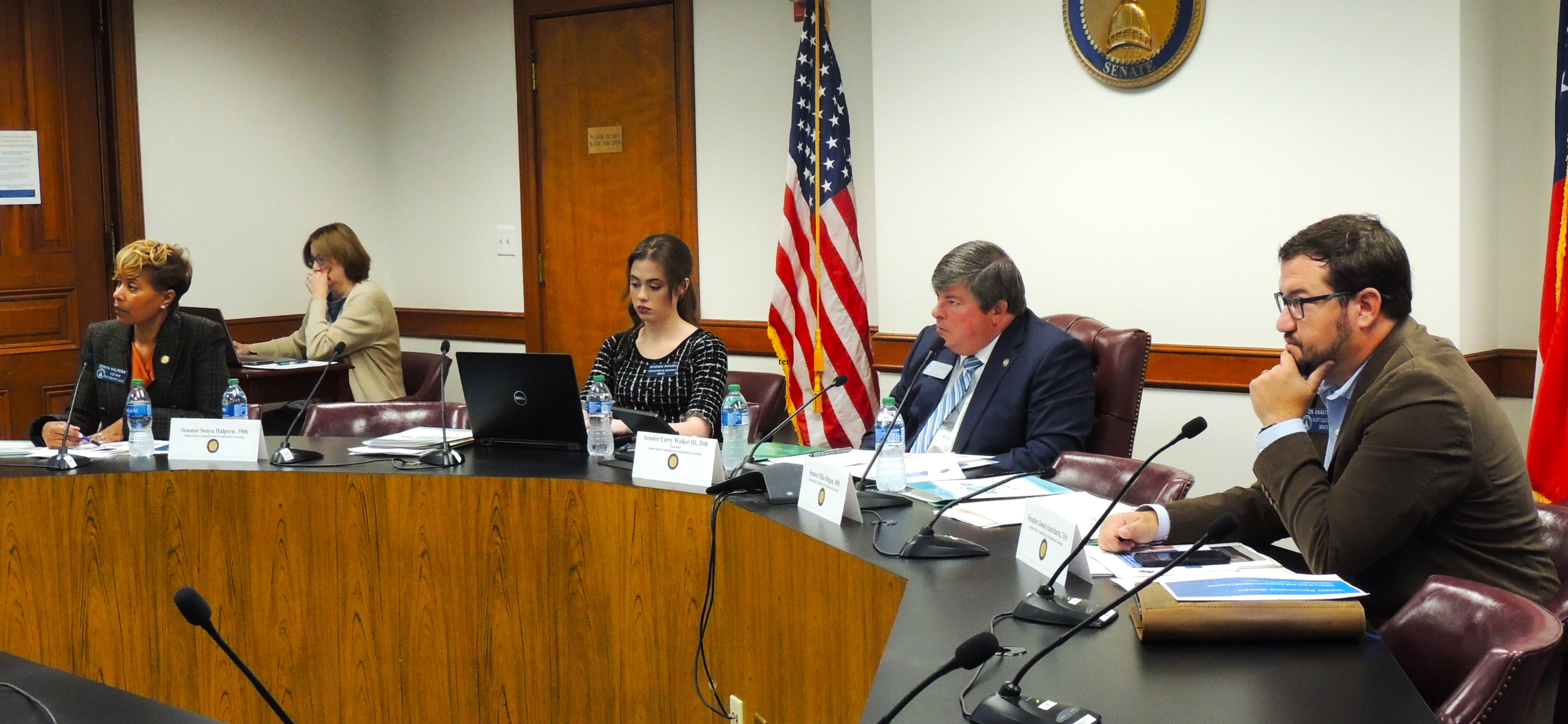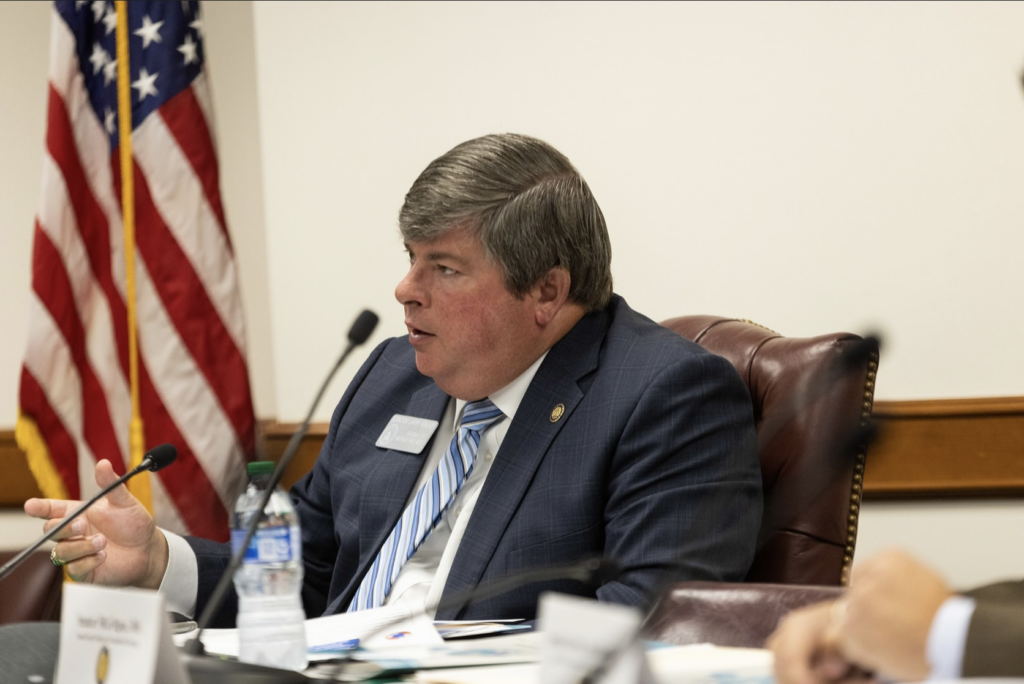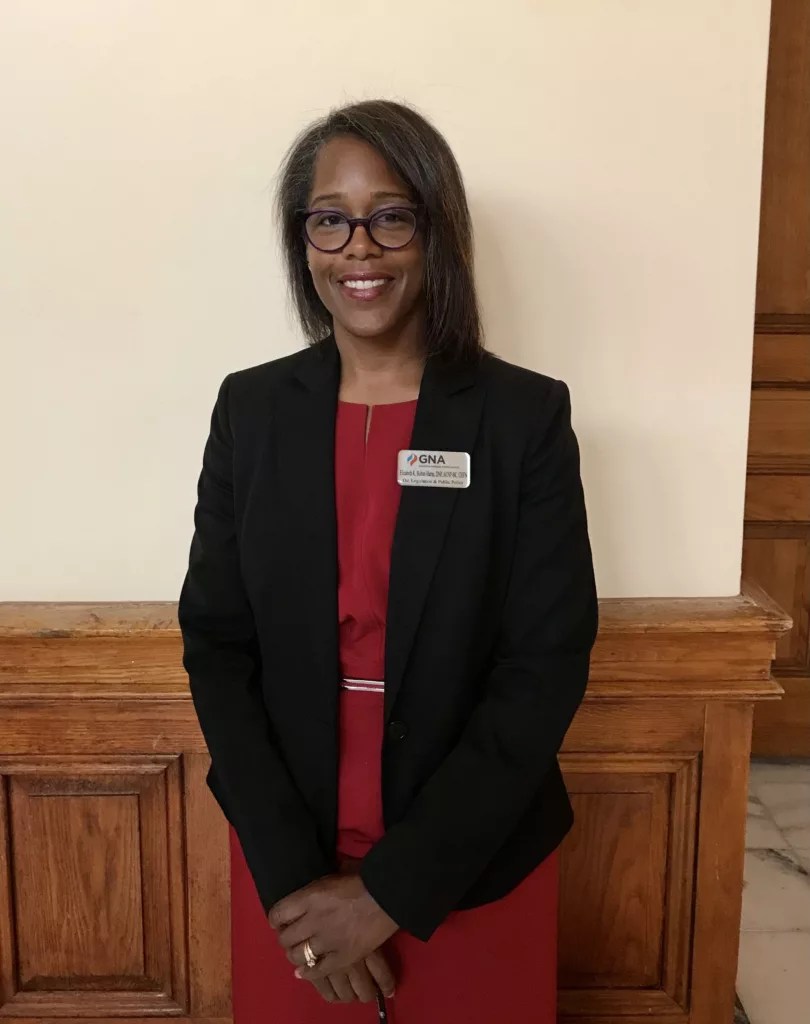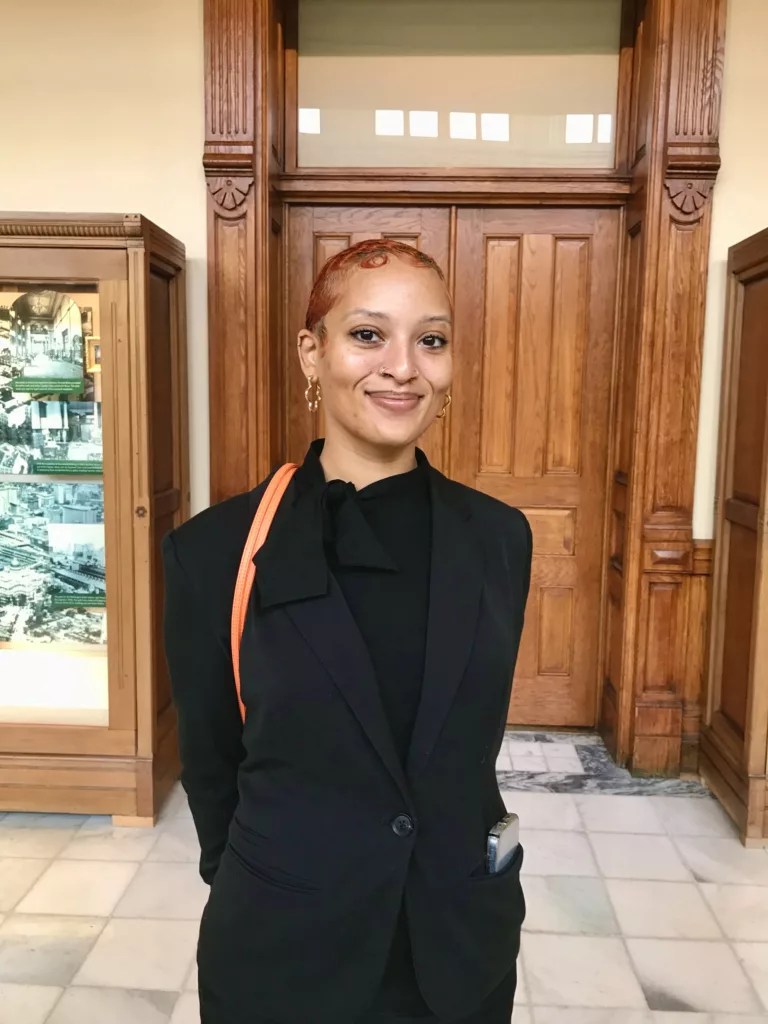Stay ahead of the curve as a political insider with deep policy analysis, daily briefings and policy-shaping tools.
Request a DemoFrom medics to makeup artists: the state’s onerous licensing requirements

Senators on the occupational licensing study committee heard testimony from nurses, land surveyors and other skilled professionals on Oct. 31, 2023 at the Georgia Capitol. (Credit: Jill Jordan Sieder)
ATLANTA — Lawmakers on Tuesday heard from representatives of nurses, land surveyors, soil scientists, military medics, beauticians and other professionals about bureaucratic hurdles they face in getting occupational licenses in Georgia. All offered legislative suggestions to make the process easier, faster, and less expensive.
The third meeting of the Senate Occupational Licensing study committee began with a presentation from Shea Ross-Smith, director of government relations for Kaiser Permanente, which is hiring former military medics and veterans with health care experience to work in its Virginia clinics.
A 2017 Virginia law allows veterans with qualifying military experience to continue to practice without having to go through the state’s civilian education and licensing process.
Kaiser’s area director in Virginia, Jamaal Lofton, said the Military Medics and Corpsmen Program removes barriers to employment for veterans transitioning out of the military. Such a program, he said, could greatly benefit Georgia, one of the top five states per capita with members serving in the military, and which also has a severe health care workforce shortage.

Land surveyors are also in short supply in Georgia, in part because it takes seven or eight years to become licensed, said Trenton Turk, a land surveyor and member of the Surveying and Mapping Society of Georgia.
The decline in new surveyors, who determine property lines for homes and commercial projects, is causing delays in real estate closings, development and infrastructure projects, and slowing down economic development, Turk said.
The society wants to shave at least two years off the four years of “focused experience” currently mandated for surveyors in the state by creating a two-year apprenticeship program. It also wants to let aspiring surveyors take the difficult national surveyors exam right after completing their education, instead of waiting for four years, as current Georgia law mandates. The would-be surveyors, Turk said, are “having to dig the books back out,” and, he noted, the pass rate for the test currently “is not that great.”

Committee Chair Larry Walker III, R-Perry, said “it’s refreshing” that surveyors “want to streamline their licensing process and lower barriers. We haven’t heard that from other industries — a lot of protectionism going on there,” he said.
Leaders of two state nursing groups want the committee to consider beefing up staff at the Georgia Board of Nursing, which has eight staff members supporting 170,000 licensed nurses, and is slow in processing licensure applications, said Elizabeth Bolton-Harris, an acute care nurse practitioner who is also director of legislation and public policy at the Georgia Nurses Association.

Bolton-Harris said the state could use some of the nearly $12 million generated in nursing licensure fees, which now goes to the state’s general fund, to hire a licensing analyst at $44,000, a data analyst at $45,000 and other staff to help speed up review of backlogged applications.
To increase health care access across the state, Robin Pingeton, a nurse practitioner and government relations chair of the Georgia Nursing Leadership Coalition, asked lawmakers to consider creating a less restrictive licensure process for advanced practice registered nurses, who now have to wait six to eight months for their credentials.
Meagan Forbes, director of legislation for the Institute for Justice, a nonprofit public interest firm, presented the institute’s recent study of occupational licensing requirements among 102 lower-income occupations across the U.S., including barbers, landscaping contractors, and security alarm installers. The study found Georgia ranks 12th in licensing burdens, including state-mandated education and training.
Most burdensome is the state’s beauty industry, where cosmetologists are required to receive 1,500 hours of training, which is ten times more training than emergency medical technicians, Forbes said.
She introduced Diamond Cherry, 27, a Georgia makeup artist who told the committee that she’d like to pursue a license, which would increase her earning power, but that she can’t afford to spend that much time in training, which “interferes with trying to make a livelihood.”

Cherry told State Affairs that it doesn’t take the 1,000 hours of training required for makeup artists in Georgia “to do what I do safely and well. It’s more about technique and artistry.” She said she could make more than $100 an hour if she was licensed, versus the $16.50 an hour she makes now working as a sales associate at a department store cosmetics counter. Upon adjourning the meeting, Walker asked senators to come back to the final meeting on Nov. 28 or 29 with recommendations for policy and legislative changes to occupational licensing, including “low-hanging fruit like makeup artists, and some more aggressive things, too — even though the hard stuff is hard to get through” the Legislature, he said.
Walker told State Affairs that among the bolder moves he’d like legislators to pursue is “a 30-day shot clock on getting a military spouse or someone who’s exiting the military their license.”
He said one reason some licensing boards say they can’t act that fast is because criminal background checks take longer than that. Walker said he’d be in favor of allowing an applicant to “do a sworn affidavit that they don’t have a felony or criminal record that would prohibit them from being eligible,” and issue them a provisional license until the background check is done, a practice happening in several other states.
Have questions, comments or tips on education in Georgia? Contact Jill Jordan Sieder on X @journalistajill or at [email protected].
Facebook @STATEAFFAIRSGA
Instagram @STATEAFFAIRSGA
LinkedIn @STATEAFFAIRS
Header photo: Senators on the occupational licensing study committee heard testimony from nurses, land surveyors and other skilled professionals on Oct. 31, 2023 at the Georgia Capitol. (Credit: Jill Jordan Sieder)
Professionals still face licensing delays amid state’s transition to online system
The Gist Georgia’s professionals and business owners are still struggling to obtain professional licenses in a timely manner. As the Secretary of State’s Office rolls out its new Georgia Online Application Licensing System to expedite the process, the efficiency of this new process is being put to the test. What’s Happening Thursday morning at the …
Controversy over AP African American Studies class grows
Rashad Brown has been teaching Advanced Placement African American Studies at Atlanta’s Maynard Jackson High School for three years. He’ll continue to do so — even though the state’s top education official removed it from the list of state-funded course offerings for the upcoming school year. While Brown prepares to start teaching his class on …
Students, teachers, lawmakers blast decision to end AP African American history classes
ATLANTA — A coalition of lawmakers, civil rights leaders, clergy, educators and students Wednesday called on the state’s education czar to rescind his decision to drop an advanced placement African American studies class from the state’s curriculum for the upcoming school year. “This decision is the latest attack in a long-running GOP assault on Georgia’s …
Kamala Harris’ presidential bid reinvigorates Georgia Democrats
Georgia Democrats have gained new momentum heading into the November election, propelled by President Joe Biden’s decision to bow out of his reelection bid and hand the reins to Vice President Kamala Harris. The historic decision, announced Sunday, is expected to prove pivotal in the national and state political arenas and breathe new life and …




